Two weeks ago, while rehearsing her orchestra, Zaeth Ritter Arenas collapsed in the podium.
On September 27, she died in hospital.
Zaeth was sister of the successful pianist Rodolfo Ritter Arenas.
Our sympathies to her family.

Two weeks ago, while rehearsing her orchestra, Zaeth Ritter Arenas collapsed in the podium.
On September 27, she died in hospital.
Zaeth was sister of the successful pianist Rodolfo Ritter Arenas.
Our sympathies to her family.

from the press release:
DALLAS, OCTOBER 2, 2015 – The Dallas Opera is proud to present one of the most eagerly anticipated new operas of the year: Jake Heggie and Terrence McNally’s GREAT SCOTT, featuring a once-in-a-lifetime cast headed by America’s favorite mezzo-soprano, Joyce DiDonato, in the title role of Arden Scott; also starring soprano Ailyn Pérez, mezzo-soprano Frederica von Stade, baritone Nathan Gunn, countertenor Anthony Roth Costanzo, bass Kevin Burdette, tenor Rodell Rosel and baritone Michael Mayes.
~~~~
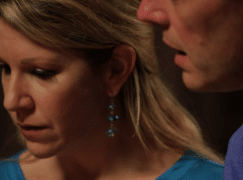
In McNally’s original story and libretto, international opera star Arden Scott returns to her hometown to try to save the struggling opera company that launched her to fame and fortune. However, as American Opera prepares for the world premiere of Rosa Dolorosa, figlia di Pompei (“Rosa Dolorosa, Daughter of Pompeii”) – the nearly 200-year old bel canto opera Arden recently discovered – she faces unexpected competition from an ambitious young soprano as well as community excitement surrounding the local professional football team’s first Super Bowl (Go Grizzlies!). The fate of the opera company hangs in the balance as Arden is forced to consider the personal sacrifices she has made for her career, and comes to understand that true greatness is a matter of heart.
Our weekend post about past relations between Pierre Boulez and his teacher has elicited this vivid memoir from clarinettist, John Hixson.

I grew up as a fan of the elusive Pierre Boulez, and having played Sacre under his lack of a baton on the Eb clarinet with a bit of rubato in a 5/7 passage, he stopped, took it from the top again, and I thought it was better to play with more exacting rhythm. In an unusual gesture, he made eye contact, gave a slight smile, and nodded.
Pierre is warmer in person than most would know from media. Impressed and moved by that, and by many conversations and meetings after, I was well read about his studies with Olivier Messiaen, another of my heroes. Pierre did get a bit teary-eyed at the following true story.
The conductor Gerry Schwartz, ex-principal trumpet at NY Phil, created a festival called Waterloo. It was a summer long festival based on principal players from good orchestras, and promising students. We were housed in the hallowed halls of Princeton University, which is my home town, and the best of the best soloists would come play. On a different note, I would enjoy conversations with Milton Babbitt and David Diamond, who were great friends, that would surprise many. We only wished Elliott Carter were there.
The concerts were held in Stanhope, New Jersey at the Waterloo Village.
One concert was to start with the US premiere of Un Sourire by Olivier Messiaen, in honour of the smile that Mozart’s music conveys. Conductor was Karl Anton Rickenbacher, a personal friend of Messiaen. Next was Brahms 4th. It was the summer of 1991.
It was a great team – Principal flute was Michael Parloff, from the Met Opera, John Ferillo, oboe, from the Met, leader was an extraordinary violinist from Finland, leader of Seattle Symphony, Gerry’s band. Clarinettist should have been Charlie Russo, a combative type from NYC Opera who had no interest in contemporary music, so he asked me to fill in.
It went off well, and the review said Charlie Russo had an unusually good tone in the Messiaen. Slightly annoying, but bygones are bygones.
Many people know that Messiaen had a strong affinity for bird song, and he notated them very well 0and used them quite musically, probably much to the annoyance of a more intellectually inclined Boulez.
But then, the most incredible thing happened.
In the first movement of the Brahms, a bird flew to the podium of Rickenbacher. It then perched on the leader’s stand, and as Rickenbacher held out his left hand as a gesture of legato, the bird flew to his hand.
It stayed there for the remainder of the entire first movement of the Brahms 4th to every knowledgeable person’s astonishment, and it was gently escorted before the 2nd movement to stage right by Maestro Rickenbacher.
We all slightly had to wonder… but we played it to close to the vest.
Parloff said to me, “nice trading high C’s perfectly in tune.” Ferillo just looked a bit stunned. Most of everyone else didn’t get the significance of what happened and I am inclined to think it is a coincidence.
But a pretty damn strong one at that.
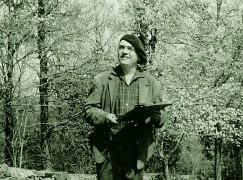
photographer unknown. text (c) John Hixson/SlippedDisc
The LA Phil music director published a strongly reasoned piece last week declaring his love from Venezuela and a zone of disengagement between him and its ruling regime.
His longterm antagonist, the pianist Gabriela Montero, has read the piece and thinks otherwise. Slipped Disc does not endorse either side in the personal aspect of this dispute. Here’s Gabi’s take, published on her social media:

Gabriela Montero: I have been asked repeatedly since Dudamel’s op-ed my thoughts on his statement that he is “not political”.
In my opinion, if you are not political you do not:
– Perform repeatedly over the years for a dictator in numerous public events.
– Have numerous photos taken in public (or private) events with the dictators and his accomplices.
– Accept to be flown in on a government private jet to perform at the closing of one of the last independent TV channels left in your country to lead your orchestra in the opening of the NEW state/socialist channel.
– Perform at and pay your respects, visibly shaken, at the funeral of the dictator.
– Perform for regime officials and the general public on the day peaceful protesting students are murdered by that same regime which funds your orchestra.
– Party with regime officials who are publicly known to be your personal friends.
– Watch a movie you are involved with at the Presidential Palace with the dictator. (This was commented on proudly by Maduro on TV)
– State that you “Have respect for Venezuela’s leaders and the offices they hold” when many of the said officials are known to be involved in corruption and allegedly also facilitate and lead the drug trafficking cartels in South America.
So on, and so on….

If Gustavo is “apolitical”, then:
– Where are the performances for the other half (or more!) of Venezuela? The opposition?
– Where are the numerous photos with the opposition leaders and victims of the regime?
– Where is the denouncement of the blatant violations of human rights of Venezuelans by the regime?
– Where are his statements concerning the arbitrary imprisonment of Leopoldo Lopez and the other 75 opposition leaders and students? Many of them tortured and held in inhumane conditions?
– Where is his outrage at the absolute collapse of his country at the hands of the authoritarian regime? His outrage at the lack of security, food, medicines, justice, etc…
It seems to me that if you promote and lend your image, your time and your music to one faction, it is that group that you belong to and stand by.
That is not someone being apolitical. It is someone being VERY political but not wanting to openly disclose it.
The Norwegian mezzo Lilly Jørstad (centre), sacked by La Scala’s Academy as ‘unsuitable’ for a second year of studies, has been rehired by the theatre for a children’s production of Cenerentola.
More here at Gramilano.
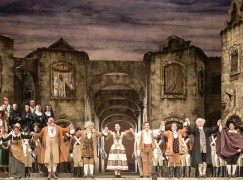
The Met’s music director has pulled out of one of his signature pieces.
The company says James Levine, 72, wants to reserve his early-season energies for Tannhäuser.
Talk of a sidekick and successor has warmed up again. Lothar Koenigs will stand in for Lulu.
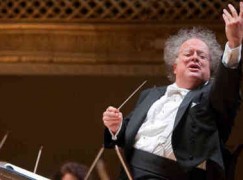
press release:
Faced with the demands of rehearsing and performing two large-scale operas simultaneously this fall, Met Music Director James Levine has decided to lighten his workload by removing the new production of Berg’s Lulu from his schedule so that he may focus his energies completely on Wagner’s epic drama Tannhäuser.
The Warsaw contest is well under weigh and the organisers have published the list of pianos that contestants have chosen to play. Apparently, they are given 15 minutes to decide.
Most picked a Yamaha or a Steinway.
Next came Kawai.
Only one contestant chose a Fazioli.
And not a Bechstein, Bösendorfer or Pleyel in sight.
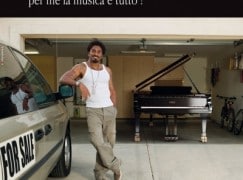
Olga Erdelyi, soloist of the Bolshoi Symphony for 40 years and teacher at the Moscow Conservatoire for 45, has died at the age of 89.
The pre-eminent harpist in Soviet times, Olga was the niece and pupil of Ksenia Alexandrovna Erdely (1878-1971), for whom Reinhold Gliere wrote his much-played harp concerto.
This was her last public recital, in 1992.
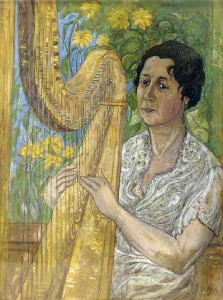 painting by Vasily Millioti
painting by Vasily Millioti
Jessica Schmitz was trying to board a plane at Chicago, heading for Houston where she’s playing on the Arijit Singh tour, when security officials treated her in the most appalling way.
Here’s what she tells Slipped Disc:
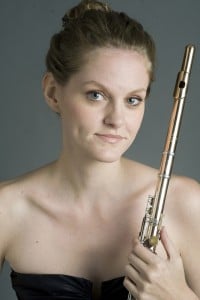
At O’Hare, I just had the worst instrument TSA travel experience of my entire life. I’ve flown with my flute at least a few thousand times, and it’s frequent they ask to look at the case, even open it, to see what it is. But today a power- hungry agent decided to mess with me and said my flute headjoint needed to be removed from its case and run thru the X-ray LOOSE in a bin.
I said this was absolutely not an option, despite three supervisors assuring me my flute made of gold “would be fine” rattling around in a bin. And when I insisted that this was not, in fact, “standard procedure” and closed the case so they wouldn’t damage it, they called the Chicago Police department to have me removed from the airport.
And that was just the beginning.
As the Chicago police were taking my license and getting ready to escort me out, one TSA agent suggested wrapping the headjoint on paper towels And then running it thru xray so it wouldn’t be dented/ damaged. Since it was either that or be escorted out by the police I had to agree. She was actually quite nice and felt horrible and let me put it in the bin and wrap it while the police and guards looked on.
When it of course came back clear, she gave it back. But then I had to get a full pat down, groin, chest and all. Then the police told me it would not be on any permanent record, gave me my license and ticket.
One agent told the police I tried to hit him, which I did not. He also detained me at the gate saying I was “not allowed to leave” until the police arrived.
If I weren’t allowed on the flight I would have missed shows today and tomorrow. When given such unchecked power the TSA are threatening not only citizens’ personal safety and civil rights, but also in this case their livelihood.
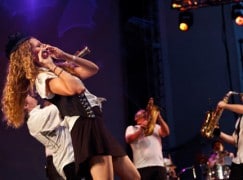
O’Hare is getting a reputation for this kind of hassle. Beware.
We have the names of the agents involved and they are being reported to the responsible authorities.
What happened next: click here.
Nicolas Mansfield, director of Holland’s Reisopera, writes exclusively for Slipped Disc about a co-pro he was planning with Gotham Chamber Opera – a production that may never see light of day after Gotham’s sudden closure.
I saw the news today, oh boy.
Another opera house shuts down. And although such events are sadly not rare these days, the news struck me hard. The Nederlandse Reisopera had made a brilliant plan with Gotham Chamber Opera.
Alessandro Stradella was stabbed to death at 42, but before that fateful event he was a hugely successful composer . His ‘San Giovanni Battista’ was the perfect opera for our co-production. A relatively unknown work which more than deserved production today. With a reasonably small cast and orchestra it was perfectly suited for performance in churches, industrial spaces and other unusual locations. To my mind this is one of those operas that needs to be freed from the constraints of the classical theatrical environment that we built in later centuries.
I first met artistic director Neal Goren and financial director David Bennett at a conference called APAP, in New York in 2013. The Association of Performing Arts Presenters is best regarded as a global speed date for everyone involved in the performing arts. As usual at these gatherings, the real inspiration is often not to be found at the numerous sessions and lectures, but during chance meetings around coffee tables or at local lunch flirts. Neal and David spoke with me there about their feisty little opera setup in New York. Ambitious and attractive productions in unusual spaces. Literally designed to inspire present day audiences to appreciate the wonderful live art form that opera can be.
Sitting in the shadow of the Metropolitan Opera we discussed the fact that opera should not only be about spending millions on the wealthy, but also about spending love on the rest. Those who haven’t necessarily developed an acquired taste but are open to anything. I remember briefly touching on the tragic demise of New York City Opera, and wondering whether or not this may somehow boost financial support for Gotham.
The Nederlandse Reisopera is an advocate of co-productions. Co-productions are not only about saving money, but also about sharing. Sharing audiences, expertise, employees, artists and even cultures. And above all, about making the world a smaller and better place through opera. That’s basically all we do.
Both Neal and I were interested in the young American director, Timothy Nelson. Timothy resides in Amsterdam and had already directed a few smaller projects for our Resident Artist’s Programme. I had recently decided to trust him with Bizet’s Pearl Fishers. Neal and I, an American director living in the Dutch capital, and two opera companies with similar philosophies. The boxes were ticked and a co-production was born.
Found my coat and grabbed my hat.
Three years had passed since our first discussions. We had agreed on the cast which we would use for the performances both in New York and for the tour in The Netherlands. Timothy Nelson was busy with his concept and here at the Reisopera we were hunting down eccentric and suitable locations throughout the country in which to perform in 2017.
Yesterday’s news about the sudden demise of Gotham Chamber Opera saddened me enormously. It’s these little jewels of opera companies that keep our art form so alive. Gotham Chamber Opera may have been just a drop in the ocean of the opera world, but at the end of the day every opera company, regardless of its size, exists by grace of an art form, and is only as good as its last emotion.
‘And though the holes were rather small
They had to count them all
Now they know how many holes it takes to fill the Albert Hall.’
The Nederlandse Reisopera will search for another co-producing partner, or replace this production. However disappointing, that’s nothing more than a minor inconvenience for us. If these sad events remind us of anything it is that attention to detail in every aspect of our work can be a matter of life and death. Our thoughts right now are with our friends in New York who loved their work and brimmed with pride every time we spoke.
And also, maybe more importantly, with the audiences which now will not be.
Here’s a link to the second act duet “Che gioire, che contento’ in which Salome and Herod sing of the emotions of foreboding and joy at the impending beheading of John the Baptist.
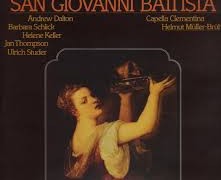
Following our exclusive report four months ago that both principal flutes had resigned from the Metropolitan Opera on the same day – one going to Los Angeles, the other to Chicago – the Chicago Symphony has now officially named Stefán Ragnar Höskuldsson as principal flute (see below).
Denis Bouriakov is already appearing as principal with the LA Phil. The Met has yet to announce replacements. Artists of this calibre are not easy to recruit.

Michael Johnson has sent us an iconoclastic piece he has written for Open Letters Monthly, deconstructing the complex relationship between former teacher and pupil, as reflected in their different styles.
At what point did Pierre Boulez say his teacher’s music made him want to vomit? The teacher, of course, was the great French composer Olivier Messiaen, and Boulez was his ex-student. Scholars have been trying to track down that unkind cut for decades but details remain clouded. Boulez has denied that he ever used the word.
Read on here.
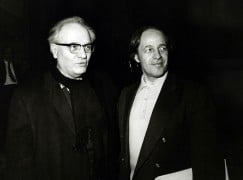
And here’s Messiaen’s take on the subject.